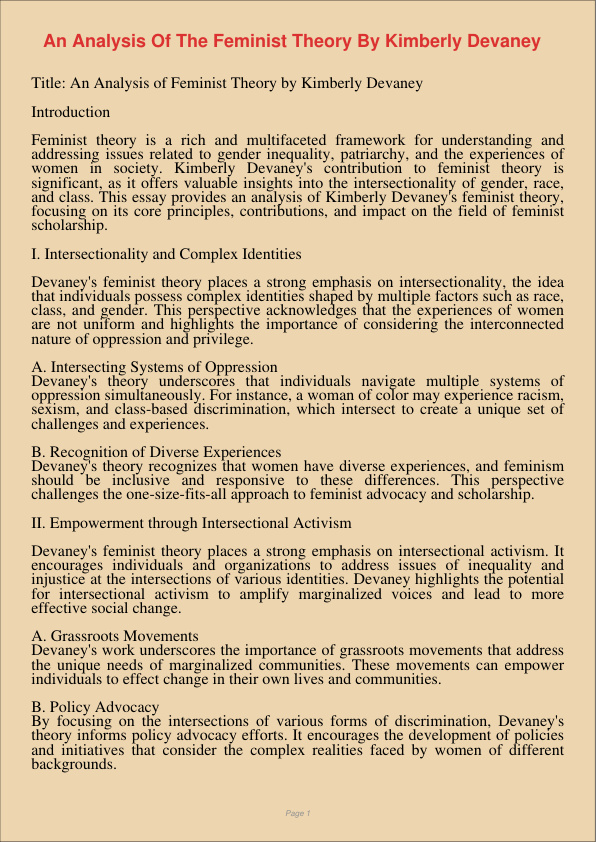An Analysis Of The Feminist Theory By Kimberly Devaney
Jan 12, 2024
kimberly devaney
feminist theory
English
Visual Arts & Film Studies

Title: An Analysis of Feminist Theory by Kimberly Devaney
Introduction
Feminist theory is a rich and multifaceted framework for understanding and addressing issues related to gender inequality, patriarchy, and the experiences of women in society. Kimberly Devaney’s contribution to feminist theory is significant, as it offers valuable insights into the intersectionality of gender, race, and class. This essay provides an analysis of Kimberly Devaney’s feminist theory, focusing on its core principles, contributions, and impact on the field of feminist scholarship.
I. Intersectionality and Complex Identities
Devaney’s feminist theory places a strong emphasis on intersectionality, the idea that individuals possess complex identities shaped by multiple factors such as race, class, and gender. This perspective acknowledges that the experiences of women are not uniform and highlights the importance of considering the interconnected nature of oppression and privilege.
A. Intersecting Systems of Oppression Devaney’s theory underscores that individuals navigate multiple systems of oppression simultaneously. For instance, a woman of color may experience racism, sexism, and class-based discrimination, which intersect to create a unique set of challenges and experiences.
B. Recognition of Diverse Experiences Devaney’s theory recognizes that women have diverse experiences, and feminism should be inclusive and responsive to these differences. This perspective challenges the one-size-fits-all approach to feminist advocacy and scholarship.
II. Empowerment through Intersectional Activism
Devaney’s feminist theory places a strong emphasis on intersectional activism. It encourages individuals and organizations to address issues of inequality and injustice at the intersections of various identities. Devaney highlights the potential for intersectional activism to amplify marginalized voices and lead to more effective social change.
A. Grassroots Movements Devaney’s work underscores the importance of grassroots movements that address the unique needs of marginalized communities. These movements can empower individuals to effect change in their own lives and communities.
B. Policy Advocacy By focusing on the intersections of various forms of discrimination, Devaney’s theory informs policy advocacy efforts. It encourages the development of policies and initiatives that consider the complex realities faced by women of different backgrounds.
III. Challenging Systems of Power
Devaney’s feminist theory challenges the systems of power that perpetuate gender, racial, and class-based inequalities. It emphasizes the importance of identifying and dismantling oppressive structures and systems to create a more equitable society.
A. Cultural Awareness and Education Devaney’s work suggests that raising awareness about intersecting forms of oppression is essential for cultural change. Education plays a vital role in fostering empathy, understanding, and a commitment to challenging oppressive norms and practices.
B. Accountability and Responsibility Devaney’s theory encourages individuals, institutions, and societies to take responsibility for their role in perpetuating systems of power. It calls for self-reflection, acknowledgment of privilege, and active steps toward social change.
IV. Contribution to Feminist Scholarship
Kimberly Devaney’s feminist theory has made significant contributions to feminist scholarship. It has expanded the discourse on feminism to include the perspectives and experiences of marginalized women who often go unheard in mainstream feminist discussions.
A. Relevance in Contemporary Feminism Devaney’s theory remains highly relevant in contemporary feminist discourse, as intersectionality continues to be a central concept in feminist scholarship and activism.
B. Fostering Inclusivity Devaney’s work has fostered inclusivity within feminist movements, emphasizing the importance of acknowledging and addressing the diverse experiences of women.
Conclusion
Kimberly Devaney’s feminist theory is a vital contribution to the field of feminist scholarship. By emphasizing intersectionality, empowering through activism, challenging systems of power, and fostering inclusivity, her work serves as a reminder of the importance of considering the complex and diverse experiences of women in the ongoing struggle for gender equality and social justice. Devaney’s theory invites us to recognize the interconnected nature of oppression and privilege, and to work collectively toward a more equitable and inclusive world.